Indiana Teacher Fighting Policy Requiring Calling Transgender Kids by Preferred Name
He thinks his Constitutional rights are being violated. They're not.
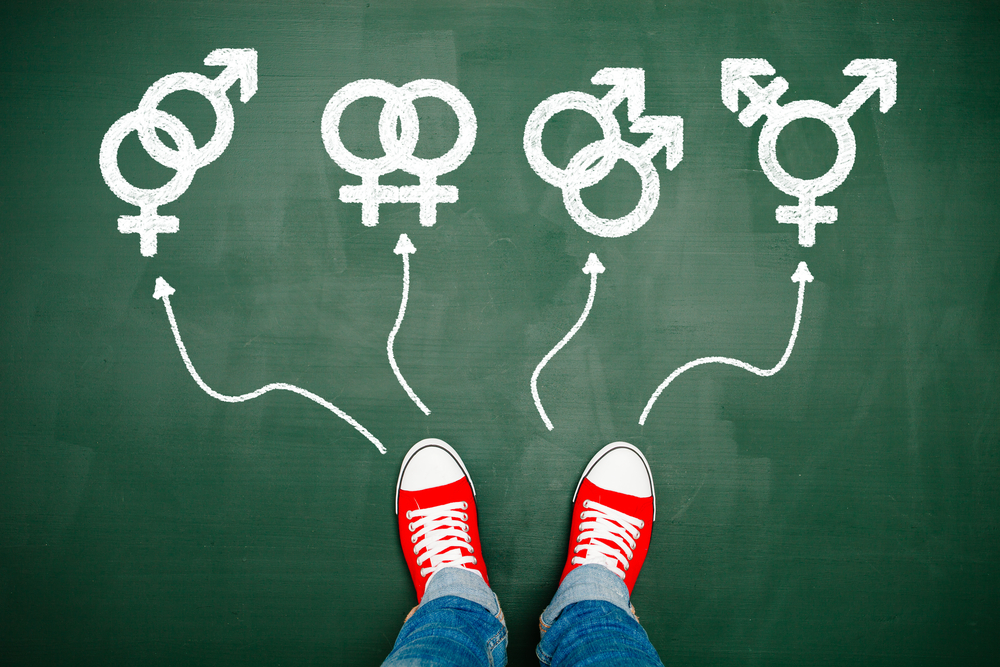
AP (“Indiana teacher challenges district transgender name policy“):
A central Indiana teacher says a school district forced him to resign following a disagreement over a policy that calls for teachers to address transgender students by their preferred name rather than their birth name.
Former Brownsburg High School orchestra teacher John Kluge said the Brownsburg Community Schools policy goes against his religious beliefs and violates his constitutional rights, the Indianapolis Star reported.
“I’m being compelled to encourage students in what I believe is something that’s a dangerous lifestyle,” the 28-year-old said. “I’m fine to teach students with other beliefs, but the fact that teachers are being compelled to speak a certain way is the scary thing.”
Students must have written consent from a parent and doctor to request the name change, according to district documents.
LGBTQ community advocates say the practice is a sign of respect and isn’t about religion or politics.
“This is not a request for advocacy,” said Sam Brinton, head of advocacy and government affairs for The Trevor Project, a national nonprofit focused on suicide prevention in LGBTQ youth. “This is a request for respect.”
Kluge said he reached a compromise with school administration that allowed him to refer to all students by their last name this past school year. He said administrators informed him a few months ago that he would no longer be allowed to do that.
While the Supreme Court punted the transgender bathroom rights case back to the lower courts when the US Department of Justice switched sides in the case, the lower courts have consistently sided with the rights of people to use the restrooms that correspond with their gender identity, most recently on May 22. That’s a much more fraught issue than this one; it’s rather difficult to argue that accommodation of a request to be called by one’s preferred name—especially one signed off on by a parent and physician—imposes a burden on others. And, frankly, it’s easy enough to simply avoid calling kids by their name at all.
The First Amendment claims that Kluge is staking are frankly laughable. The school district isn’t requiring him to endorse gender reassignment surgery or even acknowledge that gender identity doesn’t always align with genitalia; they’re merely requiring him to call students by the name their parents have given them.
If Kluge were, say, an English teacher in a relatively large high school, it might be possible for his objections to be accommodated by simply not assigning transgender students to his class. Presumably, there are very few of them at the school and there would be more than one English or math teacher. But there’s seldom more than one orchestra teacher.
I’m not without some sympathy for Kluge’s plight. Most Americans are religious and most religions, whose mores are centuries if not millennia old, have teachings on sexuality that are in contrast with relatively recent changes in social and legal norms. While all but the most fundamentalist religions have more-or-less accommodated themselves to women’s equality, they’ve had much less time to adjust on LGBT+ issues. So, I get that Kluge might believe that “transgender” isn’t really a thing or, if it it, that it’s something that needs to be healed.
But, even aside from the legal issues, Brinton is right: this is, ultimately, about respect. Kids having sexual identity issues have enough to deal with without having teachers contribute to the problem.

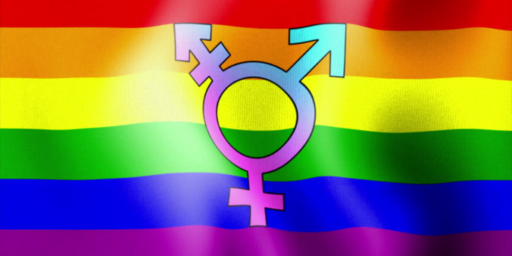
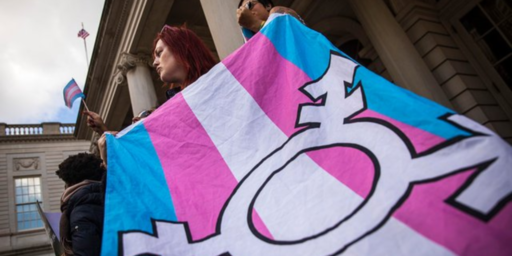

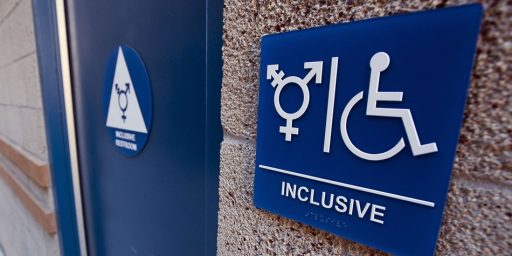
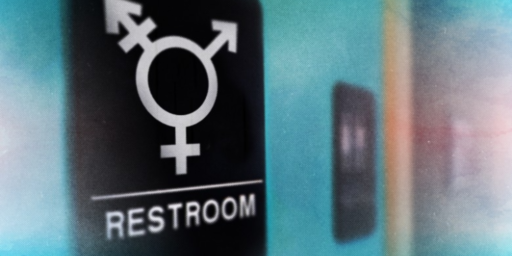
As someone who goes through life with a name completely unrelated to my legal name, and who never has anyone make a big deal of it, I just want to say that Mr. Kluge is an a..hole and the district has a completely insane policy.
If a kid with the legal name of Scott wants to be called “Skip”, does he need a special note from parents and doctors, or is this just for the transgender kids? What about the unfortunate boy named Leslie after his great grandfather who lived when that was mostly a man’s name?
You refer to people by the name that they refer to themselves as. Just as you would want them to refer to you by the name you refer to yourself as. It’s so easy and straightforward, even a fundamentalist Christian can understand it — “do unto others…” and all that.
@Gustopher:
There are limits to that, I think. As Steven Taylor and I were discussing the other evening, it’s hard to call college students who want to be called “Sparky” Sparky. A couple years back, I had a (male) Marine aviator who liked to be called by his call sign, “Lady.” I called him “Chris.”
Just an FYI – Judaism has had teachings on respecting gender fluidity basically forever. In traditional Judaism, there are six gender classifications, including explicitly trans or gender indeterminate. These laws and discussions have been codified for close to 2,000 years in the Mishnah and are still in play today (see this twitter thread on how the biblical story of Elijah and the traditional understanding that Angels are non-binary factored into marriage law regarding trans individuals today.)
Put another way, stop conflating Christian views with religious views. 🙂
@James Joyner: Did being called Chris upset him?
@SKI: Fair enough—although I suspect most Jews still have the same hangups on these issues as Christians.
@SKI: No.
@James Joyner:
At least most American Jews. Comes from growing up in the US culture.
As an aside, I think part of the reason that the right-wing evangelical Christians in this country have such a problem with people who are different is that they have pretty much always had the ability to not be responsible, legally, for their intolerance. If you aren’t just a religious authority but a secular/legal one as well, you have to grapple with the actual people impacted by your rulings and their families. It adds nuance and compassion to positions and rulings.
And that makes all the difference.
@Gustopher
I would agree to that within basic limits. Like James noted, what if a student picks a name to deliberately troll you? Are you expected to call someone Asshole if they arrive with a note saying so… and it can happen, kids have been forging parent’s signatures forever. Nothing insulting, nothing intended to demean, etc. Imagine teaching a classroom of giggling young boys who all want to be called Rock Hardballs!
But still, society tends to see one’s name is a “gift”. From your parents, nicknames from friends or sobriquets / call signs / nomme de guerre for deeds, they are all bequeathed by another to a person. The idea that you name yourself – and thus control your image rather then have it dictated to you – is powerfully linked to the concept of freedom. It’s can also be viewed as social disrespect when some people think you’re voiding someone else’s decision when you choose a new name. “Your parents gave you that name, what’s wrong with it?” Changing who you are is always going to piss someone off but since they’re not you, do they really have a say?
A third factor here is linguistic laziness. English has a limited set of pronouns compared to other languages – hell, we don’t even have an official second-person plural pronoun anymore and most Americans don’t even notice! I bet if you tried to introduce a new pronoun that had nothing to do with gender it would still be negatively received by the public. People get set in their ways and don’t want to learn – it’s easier to just claim “my faith says no way” then have to remember how to conjugate correctly and what pronouns go where. Don’t want to remember that Billy / he now wants to go by Sandra / she or possibly Marie /him. Religious intolerance being used to excuse unwillingness to put in the time and effort to properly learn someone’s name and preferred address.
@SKI: @James Joyner: For that matter what does Christianity have to say about transgenderism? As far as I’m aware there isn’t any Biblical verse commenting on the matter one way or another, the way there is with homosexuality. I suppose a lot of people equate the two, especially someone from a very conservative background. But I’d be curious to ask this person where he derives a religious prohibition against adopting a name of the opposite gender.
Now, I’m not saying any of that necessarily makes any difference to the case legally or constitutionally. As I said in the other thread when I talked about the analogy with opposing interracial relationships on religious grounds, all that matters is that the belief exists, and deciding which beliefs have more basis in a particular tradition is beyond the scope of the courts. Whatever the belief is, people have a constitutional right to it–within the normal limitations surrounding such rights, which is to say it doesn’t give anyone carte blanche over other people’s rights.
I don’t give them a break for living by ancient mores in modern times. The Bible is full of things nobody believes in anymore (when was the last time we stoned an adulteress?)(Never an adulterer, boys will be boys ya know) Time to join the 21st century.
I am trying hard to think of more than 1 or 2 Christian churches that give much more than lip service to women’s equality. Certainly not the Catholic Church or Evangelicals.
@Kylopod:
Most people will quote you passages regarding men and women wearing the other gender’s clothing because they mix up transgender and cross-dressing. In reality it all depends on what the original wording says. @SKI’s link notes the differing words used that would indicate someone who today would be considered trans but since English has few pronouns as I noted above, they all got smashed into a binary configuration.
I would say Deuteronomy 23:1 would count. It marks a male who’s genitals have been removed or damaged is not to be “admitted to the assembly of the LORD”. Now, as this is part of the section that deals with worthiness and cleanliness criteria for entry to the congregation (the next line is about bastardy), it’s not a statement about gender. Physical imperfections were not tolerated well and genital alteration would be ranked among it.
Losing one’s testicles (eunuch) doesn’t make one un-male since the Hebrew pronoun doesn’t change however it marks one as “blemished in the eyes of the Lord” by way of physical deformity. Thus having genitals and gender are separated as concepts in the Law in this instance. You can still identify a male, you just can’t be part of the assembly.
@OzarkHillbilly:
I mean in terms of how they deal with the outside world. Churches aren’t telling parishioners that they shouldn’t vote for women politicians or call women “Ms” vice “Miss” or “Mrs” these days. Many more are railing against the evils of homosexuality and transgender.
@KM:
Let’s keep in mind (and I assume you realize this as you mention Hebrew pronouns later) that the Hebrew language is still grammatically very strictly divided into masculine and feminine, even if the Jewish tradition recognizes more natural genders.
@James Joyner:
So we are in agreement, lip service.
Thus far in my odd life I’ve been called Michael, Alex, Frank, Carter and David. I’ve written books as Francine, Katherine, Pat, the initials KA, AE and ‘C’, and of course, Michael, and others I’ve forgotten. I’ve still written more books as a woman than as a man. Over the last two years I’ve had to replace the name Jake with the name Clara for my transgender daughter.
Names are not really all that big a deal. They’re just labels of convenience.
This teacher deserves to be fired. Not because he disagrees with the consensus on transgender kids but because he’s an asshole who puts his own hang-ups ahead of the kids he’s meant to be teaching. He has a job to do. He should do it. If he can’t make this much of an accommodation then he’s no teacher and should be invited to fck right off.
I’m used to people that don’t like to be called by a certain part of their name or by their surname(That’s pretty normal among Brazilians), so, that’s completely idiotic. If a male wants me to call him Bernadette then he is Bernadette, the same for a transwoman.
And even with that, it is simplistic and flawed to argue that the Bible is “against” homosexuality…
I wonder if Mr. Kluge would have been okay with it if one of his students called him “John” instead of “Mr. Kluge?”
Or would such a student would have been sent to the Principal’s office for a talk about respect and basic human decency?
@James Joyner: “it’s hard to call college students who want to be called “Sparky” Sparky.”
As a fellow college professor, I don’t understand this at all. Some kid wants to go by Sparky — why should I care? If he wants to call me Sparky, that’s another issue… but why is what he calls himself anything that should concern me?
@michael reynolds: ” because he’s an asshole who puts his own hang-ups ahead of the kids he’s meant to be teaching.”
Thank you. Because this really is the center of the issue. Is the kid going to learn any better if you refuse to use the name that student chooses? Somehow I doubt it.
Most conservatives seem to believe that the only meaning of the First Amendment is “I have the right to be a dick to everyone I want, and no one can criticize me for it.”
https://www.youtube.com/watch?v=Zoc7UYVVyXY
@KM:
Actually, the “Assembly of the Lord” traditionally refers to marriage, not citizenship. That is, if you have been made a eunuch, are a mamzer or of an Ammonite or Moabite, you can’t marry within the Jewish community. See Mishnah Yevamot Chapter 8. That same commentary goes on to talk about
Note that the presumption by the Rabbis, misogyny aside, is that the non-binary person is still a member of the community and may in fact be expected to marry and be in a relationship – despite the apparent ban from the text of Deuteronomy. Biblical literalists don’t/can’t understand the Five Books of Moses.
Given that our theocratic state government is likely to side with the gentleman in this case, I would like to go ahead and pre-emptively thank this man for all the legal fees the ACLU of Indiana will receive in about one year’s time.
You name my job as a financial officer so much easier.
Am I missing something about the name Sparky? Why wouldn’t you use that for someone who wanted to be called that? Is there something naughty about it or something?
My only experience with the name, as a longtime resident of Michigan, is Sparky Anderson. He was a cool guy, so my impression is that it’s a cool nickname.
@Franklin: Sparky was Steven’s example; I find it rather awkward and silly but it’s true that I recollect Sparky Anderson and don’t find it funny that he’s called that.
Not to be snarky, but I have to admit: when I got a look at this guy, my “closet case” radar went on full scale alert. It’s all too often the self-loathing folks that make life hell for others of their tribe in their attempts to compensate and to hide their secrets.
That said, this guy’s job is to teach kids. If he can’t do that equitably and reasonably, with an eye to what is best for his pupils (as opposed to himself), then he has no business being a teacher and was justifiably terminated.
@Gustopher: Your ending comment just happens to have abutted my question, so I decided to ask it: Why is it that all of these people whose freedom of speech is being trampled upon–and who seem to all be Evangelical Christians–have never read the Sermon on the Mount? If they would go read it and live by it (right, like THAT’S gonna happen), about 105% of our country’s social policy problems would probably disappear, quite suddenly I would add.
@HarvardLaw92:
I don’t know about you, but for me that’s a default assumption for anyone who’s homophobic or transphobic to a pathological degree. At this point I barely even think about it. I don’t think I’m alone in that reaction. Indeed, I think the whole talking point about homosexuality being a “choice” is itself a tell.
As I’ve mentioned here before, my younger child transitioned from male to female at age 19. At some point, we were getting impatient with her, because she hadn’t chosen a new (female) name yet, and yet she wanted us to use female pronouns.
Yes, this was difficult, especially at the beginning. I don’t feel especially judgemental about people saying, “Whoa, that’s hard!” about name and/or pronoun changes. It was hard for me. It was totally worth it in terms of the change in her level of happiness and lack of depression, though. It meant so, so much to her.
And so my message to Mr. Kluge or anyone else is that if you think any child is worth it, then these children are worth it. And if you don’t think children are worth it, why are you teaching them?
@michael reynolds:
More importantly, this teacher deserves to be called “Joanna” by absolutely everyone until he finally gets it.
@James Joyner:
Yes, but you seem to have set them in a weird place…
It is? Seriously? Do you also have trouble with people who go by Skip, Skippy, Skipper, Bud, Buddy, Jack, Rock, Buck, Bucky, or Bubba?
Did he take that as a deliberate insult, Jimmy? I would have, in his place — especially if his given name was actually Christopher, and you took it on yourself to use a familiar diminutive that wasn’t the one he wanted.
I mean, if Thomas Jones normally goes by ‘Hemorrhoid’ and wants you to call him that too, I can see maybe opting for “Mr. Jones”. Possibly ‘Thomas’. Not Tom, or Tommy, or any other nickname. But ‘Lady’ (much less Sparky) is nowhere near the “my aesthetic preferences trump my common courtesy” threshold, if that’s what the dude wants to be called.
@DrDaveT: He introduces himself as “Chris.” His wife calls him “Chris.” Marine aviators often go by their call signs in professional settings but it’s not insulting to call them by their given name. Indeed, for the most part, non-aviators do so.
@James Joyner:
So when you said “liked to be called by his call sign”, you meant something not actually relevant to this discussion, because he didn’t mind being called other things? Got it.
If (hypothetically, apparently) he did NOT like being called Chris or Christopher, and introduced himself as Lady, and was called Lady by his wife and friends, would you have had any difficulty calling him that?
(And now I’m dying to know his last name — Day? Luck? Godiva?)
@DrDaveT: “Lady” was apparently intended as a derisive nickname for another aviator, got switched to him by the squadron commander as some sort of punishment, and he then decided to keep it as an Ef You to said squadron commander.
Yes, a different issue. I can’t imagine calling someone by a name that I knew offended them or triggered negative associations. I suppose I’d have gotten used to calling him “Lady” if it were a big issue; it just felt silly and would make leading the seminar a little awkward until I got used to it. I seldom call aviators by their call signs even when they’re not silly.